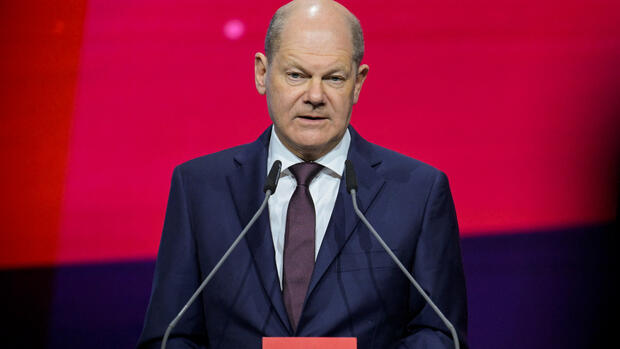Hanover With the words “Walk the talk”, Federal Chancellor Olaf Scholz promised in his opening speech at this year’s Hanover Fair that he would follow his words with deeds. “A lot has been left undone in recent years, but we’re catching up now.”
The Federal Chancellor also includes an EU free trade agreement with Indonesia, which is this year’s partner country at the Hannover Messe. “I’m committed to finally bringing this agreement over the finish line,” said Scholz. Because that would create a common economic area with well over 700 million people in one fell swoop.
In order to solve the EU’s supply dependency on China, the Federal Chancellor urged in his speech for an expansion of the raw materials partnership with the country. “If we succeed in locating more processing stages where the raw materials are stored in the ground, then that will not only create greater prosperity there,” said Scholz. “Then we’ll also ensure that we have more than just one supplier in the future.”
This also applies to an EU-Mercosur free trade agreement with Mexico, Australia, Kenya and India. “Countries around the world are working to reduce risky dependencies,” explained Scholz. Instead of decoupling China, Scholz therefore called for “de-risking”: i.e. a reduction in risks that arise from excessive dependencies, instead of mutual isolation of the two economic areas. Germany, for example, is currently importing many raw materials from China.
“Even though the rare earths, copper or nickel are often not even extracted from the earth there,” says Scholz. Instead, the rare earths would be mined in countries that benefit far too little from their natural wealth of raw materials. Countries like Chile, Namibia – and Indonesia.
With economic growth of more than five percent, this year’s partner country is back on the road to recovery after the corona crisis – mainly because of expensive raw materials, which are fetching record prices on international markets. Indonesia’s goal is now to bring more labour-intensive manufacturing into the country.
Industry association: “Free us from excessive bureaucracy”
The country should have become a partner country as early as 2020, but the fair was canceled that year due to the pandemic. At the fair, which takes place from April 17th to 21st, the country presents more than 150 exhibitors. By 2030, Indonesia wants to be one of the top ten global economic players.
Chancellor Olaf Scholz, President of the Republic of Indonesia Joko Widodo and his wife Iriana at the opening of the Hannover Messe.
(Photo: IMAGO/localpic)
“If we rightly speak of the 21st century as the Asian century, then there is no getting around Indonesia,” explained Scholz and thanked the partner country for taking part.
In addition, the Federal Chancellor pointed out that Germany must increase its pace of investment. This requires reliability for investors, a fast “Germany pace” for approvals, and the necessary specialists. The goal of climate neutrality by 2045 requires huge investments. Four to five wind turbines, more than 40 soccer fields of photovoltaic systems, 1600 heat pumps and four kilometers of transmission networks would have to be built every day.
“For such results, I like to stay awake for three days at a time,” announced Scholz.
However, for a competitive industry it is also imperative to reduce obstacles such as excessive bureaucracy and overly strict regulations in Germany, explained Gunther Kegel, President of the Central Association of the Electrical Engineering and Electronics Industry (ZVEI), during the opening.
“You and your government have more faith in the prudent and responsible actions of companies and resolutely free us from excessive bureaucracy and regulation,” Kegel demanded, addressing Scholz. The president of the industry association reported that the bureaucracy is a burden that can hardly be borne, especially for small and medium-sized companies in the industry.
“The improvement and optimization of existing regulations while maintaining all protective tariffs is not sufficient,” says Kegel. If you want to mobilize market forces for climate protection, regulations have to be completely eliminated, cumbersome laws at least temporarily suspended and the extent of new rules reduced to an absolute minimum. “You can’t make an omelet without breaking an egg!”
Federal Education Minister Bettina Stark-Watzinger also called for in her speech: “No blinders and fewer red lines.”
The fair was canceled in 2020 due to the pandemic and had to significantly reduce its program in the past two years. This year, however, the event once again has more participants: around 4,000 exhibitors will present themselves at the Hanover Exhibition Center until April 21st. These include Siemens, SAP and Festo. In addition, a number of medium-sized companies had registered, trade fair boss Jochen Köckler announced on Wednesday at the exhibition center. In addition, more than 300 startups are coming to Hanover.
More: “Have the largest nickel reserves in the world” – Indonesia’s President is campaigning for a billion-euro investment from BASF
